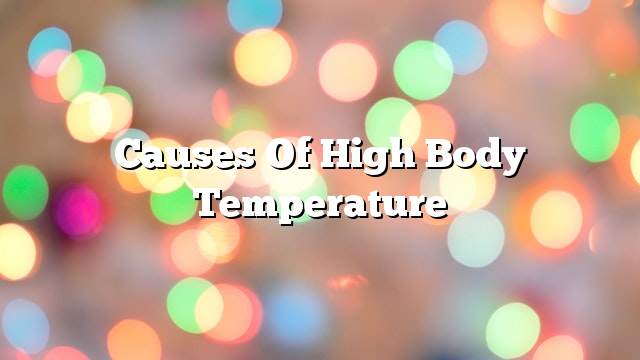High body temperature
Temperature is not a disease in itself; it is a symptom or symptom of a disease. The normal temperature in the human body is 37 degrees Celsius. The temperature of the body is regulated by the body’s heat regulator and the substances produced by the white blood cells Inflammation, the mechanism of high temperature is increased activity of the muscles that cause the production of energy in the form of fever, and a small rise in temperature does not cause damage to the body, but when the high temperature dramatically must be reduced directly; to avoid damage to brain cells.
the reasons
- Infection, or the presence of inflammation that causes the release of chemicals from the white blood cells, lead to elevated temperature.
- The presence of a viral disease, infectious disease, or bacterial disease.
- Inflammatory diseases such as arthritis, immunodeficiency, and vascular disease.
- The presence of different tumors and sunstroke.
the cure
The difficulty in treating hyperthermia is the inability to distinguish between causes of high fever. There are diseases that cause hyperthermia and need simple treatment. There are serious diseases that cause high temperature and need specialized treatment. They are used to avoid the effects of high levels such as aspirin and paracetamol. A prescription, but aspirin is not given to children under 13 years old to avoid damage to the liver and brain.
Cases where you should see your doctor
- Children under the age of two months who suffer from high temperature rise.
- Elderly people due to weak immune system.
- Chronic diseases, such as stress, and diabetes associated with high fever.
- Heat with the presence of heart disease or pulmonary diseases.
- Fever associated with respiratory diseases, accompanied by vomiting and nausea.
- Sore throat that causes trouble swallowing and high fever.
Temperature diseases
- Heat stroke: a high temperature of the body, exceeding the temperature of 41 degrees Celsius; because of the exposure of the body to high temperature, and inability to regulate, and cause dry skin, rapid heartbeat, and feeling dizzy.
- Thermal stress: a stage preceding the injury of the sun, and symptoms of rapid breathing, weak heartbeat, and sweating.
- Thermal fainting: a loss of consciousness due to a large temperature rise.
- Thermal cramps: a spasm of muscle, the result of exercise under the scorching sun.
- Thermal rash: It is the redness and irritation of the skin due to heat, excessive sweating.
- Thermal Congestion: It results from short-term stress at high temperatures, accompanied by respiratory problems and muscle spasm.
